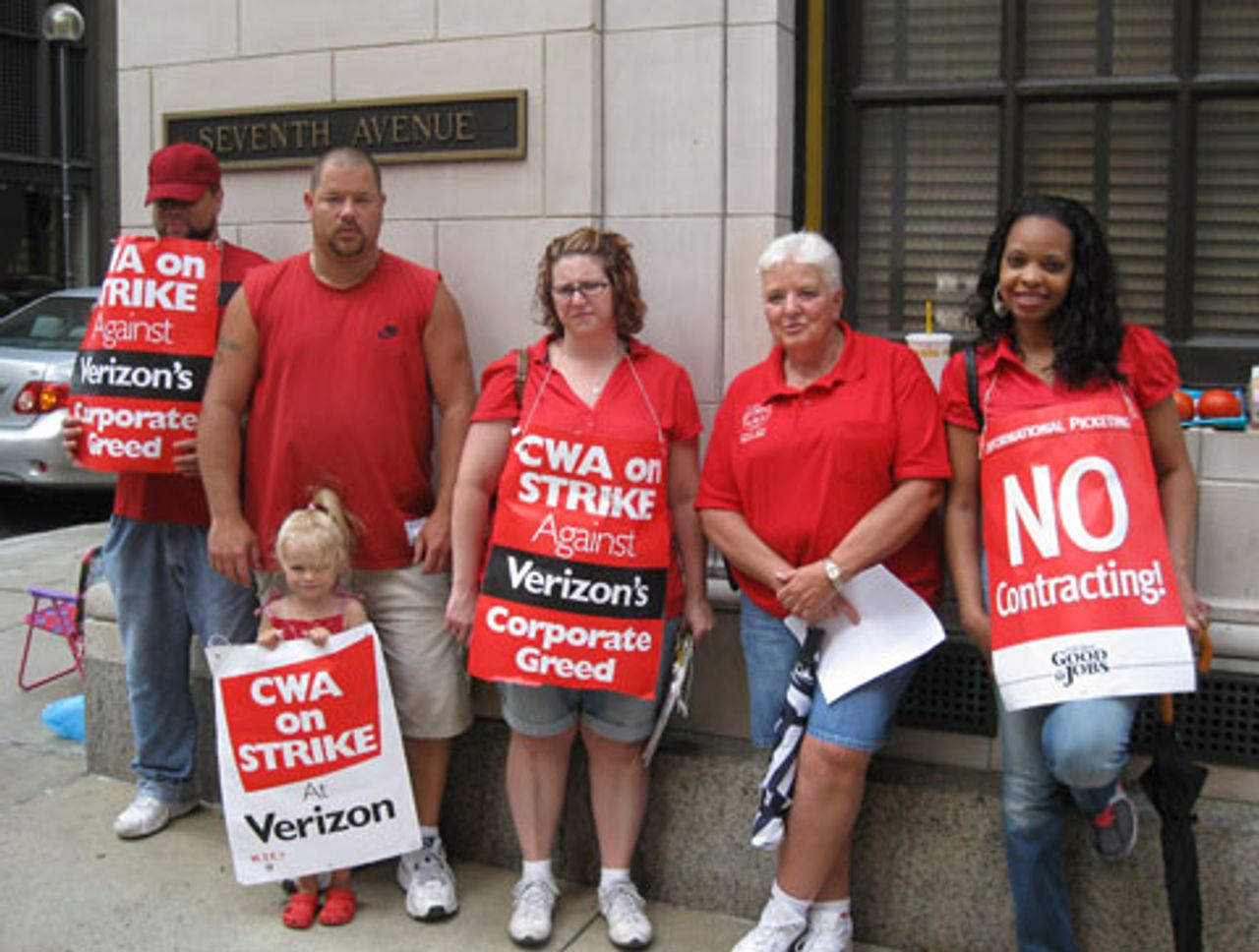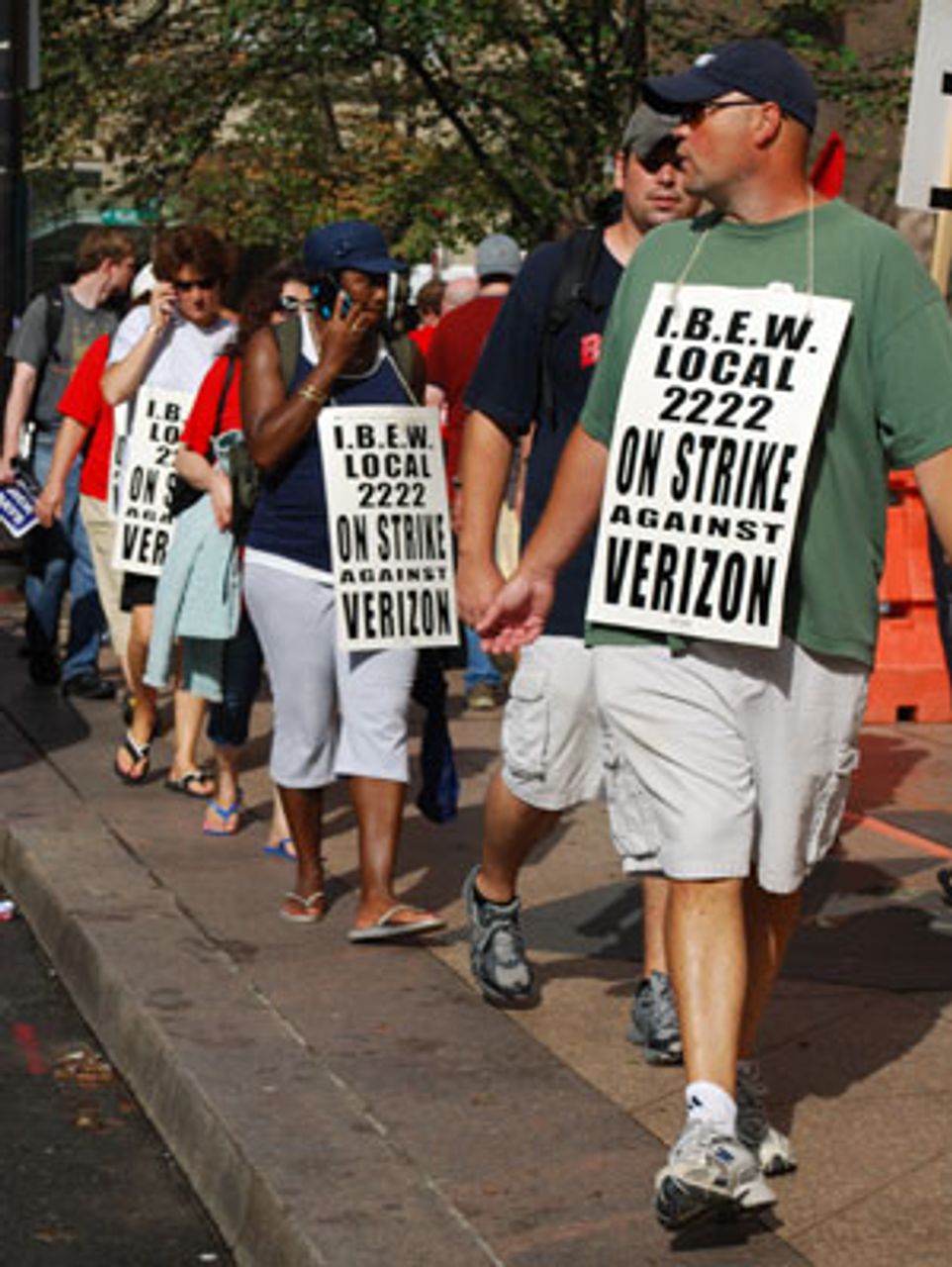 Pittsburgh Verizon strikers
Pittsburgh Verizon strikersThe walkout by 45,000 telecommunication workers against Verizon is entering its fourth day after informal talks between the company and unions produced no results Monday. The company is apparently digging in for a long struggle and has rolled out a strikebreaking plan long in preparation.
Thirty-five thousand members of the Communications Workers of America (CWA) and 10,000 members of the International Brotherhood of Electrical Workers (IBEW) went on strike Saturday night, affecting the eastern US, from Virginia to Massachusetts.
Verizon provoked the strike in order to deliver a decisive blow to workers and take a major step toward reducing them to the status of casualized labor without the slightest job protections or wage and benefit guarantees. The company, which made $10 billion in profits last year, wants to freeze pensions for current employees and abolish them for new workers. It wants to cut sick days and force workers to pay more for health and dental coverage—a measure that will impose a de facto wage cut of thousands of dollars a year.
While workers are determined to fight this attack, the company is counting on the CWA and IBEW to capitulate. In a letter to Congress on Tuesday, Verizon pointed out that the CWA had already accepted similar demands from AT&T. For their part, the unions—which have allowed the destruction of tens of thousands of jobs since the last walkout in 2000—have said they would call off the strike if Verizon “seriously negotiated” with them.
 Pickets in Boston
Pickets in BostonThree production workers were injured on Monday, including one worker who was knocked unconscious when he was struck by a car driven by a manager crossing the picket line. In another case a security guard hired by Verizon punched a worker, knocking him to the ground. Since the beginning of the strike, 20 workers have been hit by cars driven by supervisors and strikebreakers, according to the CWA.
Verizon is seeking or has already obtained injunctions against “illegal” and “reprehensible” strike activity, with the courts in Pennsylvania ordering workers to stop blocking management from entering the buildings. The company has blamed service disruptions on supposed sabotage by striking workers and has offered $50,000 rewards for information about damaged equipment.
A union shop steward in Boston told the WSWS that the company was taking legal action to stop strikers from picketing Verizon Wireless, where some 135,000 non-union workers are employed. He also said Verizon was bringing managers and strikebreakers from North Carolina and other southern states to keep operations going.
Verizon’s is the nation’s second largest telecommunication company behind AT&T and the biggest wireless company with over 105 million subscribers. Over the last four years it has paid its top executives $258 million.
Verizon is attempting to offset the loss of land lines—as more customers switch to cell phones—by deploying fiber optic cables, known as FiOS, which can provide high speed Internet, cable TV and telephone service combined. The upgrade is very expensive and is leaving Verizon with a mountain of debt.
In a letter to management employees, Verizon’s new CEO, Lowell McAdam, said the company had slashed jobs, cut management benefits and sold off some of its wireline businesses, but this was not enough. “Some of the existing contract provisions are not in line with the economic realities of business today,” he declared, adding that public sector workers and auto workers, have “already dealt with this competitive transformation.”
The reference to the auto industry should give Verizon workers pause for thought: there the UAW accepted the reduction of new workers’ wages to $15 an hour, half of what workers traditionally earn. In the name of keeping the companies “competitive,” the UAW is now preparing to abandon hourly wage increases and tie pay to productivity and profitability, a demand that Verizon is also making.
On picket lines in New York, Virginia and Pennsylvania, striking workers spoke to the World Socialist Web Site about the issues in their struggle and distributed the Socialist Equality Party statement, “Mobilize the working class behind Verizon strikers!”
Norfolk, Virginia
Ron, a cable splicer, said, “They want to get rid of all us wire-line workers. They only want to be in the wireless business. For the last few years we have been forced to pave the way for the destruction of our own positions; every time we run copper cable to a wireless tower, we make it easier for them to eliminate us. We set them up and they are kicking us to the curb.”
Asked about whether the company was using the threat of high unemployment against the strikers, Ron insisted, “Absolutely they are. They tell us, ‘if you don’t like your job, quit.’ There are ten thousand people who would be happy to have my job.”
Stew, an engineer with 11 years experience, said he and fellow strikers just wanted to defend their jobs. “People don’t understand that land lines for the phones are critical infrastructure. If they go down for any amount of time, it’s going to really hurt businesses. All of the wireless calls and data have to go through land-lines somewhere. Land-line phones are critical in hurricanes and other emergencies, as cell towers don’t work in power outages and high winds can bend their antennas, disrupting service. People with health problems in particular need land-lines.”
Pittsburgh, Pennsylvania
 Summarae Craighead
Summarae CraigheadSummarae Craighead, who has 15 years with Verizon and works as a customer service representative for large businesses, said “We are here for job security, health care, pensions, vacation, our families. Ivan (Seidenberg, former Verizon CEO and current chairman) makes $55,000 a day. That is what we make in a year.
“I said we are fighting for our families because if we take the cuts the company wants there are many people who won’t be able to pay their mortgage. People have commitments that they won’t be able to keep.”
Phil, another service representative, added, “They are trying to take back everything the union has fought for over 50 years. The company has made billions in profits. They shouldn’t take things from us. I have a 15-year-old son who still lives with me, so health care is very important to me. We are just trying to maintain our standard of living.”
Karen Burkovich, a repairman with 15 years of service, said, “This is our jobs, our careers. Our whole way of life depends on this. We depend on having a pension, health insurance and vacations. We are not asking for what the CEO makes, but we want to keep our standard of living.
“We are not just fighting for the rank and file, but for the retirees as well. The company wants to cut their benefits too. I am not on the street because I want to be, I would rather be in there working, but I am here because I have to. We cannot let Verizon push us back like this.”
New York City
Denora Diaz, a technician, said, “The biggest issue for me is job security. The company is trying to do away with our jobs.”
Commenting on the recent deal to slash federal spending, she said, “The budget cuts Obama is making are frightening. It means you cannot get sick any more. I feel history repeats itself. All great empires have collapsed. Why? Because the majority of people get tired of a few people running everything from the top.
“When you have enough people getting together who have no jobs or food, the people will get together to fight the system. Since the 1960s they have tried to blind people with money. That is what happened. People got jobs, money and benefits after the 60s, and things seemed all right.
“Now, when it gets down to it, we don’t have a choice. I feel we have to have a revolution in this country. How can you let the companies eliminate our jobs, security and rights?”
Mary Bagan, who is also a technician, said, “I don’t think the majority of people can see what is going on yet, but more and more people are having their eyes opened. The gap between the rich and poor is growing rapidly. They are now saying you thought you had a retirement. Guess what? You don’t. Meanwhile, the bankers are getting richer with their Ponzi schemes.
“Because everyone knows in their heart, how can I put this politely, that there is a kinship between the company and the union, everyone wonders how we can really win this strike.
“We would have to be out here for a long time to beat them. We would have to take away enough revenue from Verizon. Moreover, we are in the technology business where they are trying to use people less and less. They may be shifting the operations around to get rid of us.
“It is coming to a point where there is no choice. You are going to be on one side or the other, and I don’t think the rich are going to invite me onto their side. I am a worker, and I am from the Bronx. You never thought things would be like this again in this lifetime.
“When people feel this is happening in their backyard they will feel differently and say we need to start a movement today. When you get hungry, your thought process starts to focus and change, and you think that we have to do something. It is just 1 percent against the rest of us.”
Subscribe to the IWA-RFC Newsletter
Get email updates on workers’ struggles and a global perspective from the International Workers Alliance of Rank-and-File Committees.
